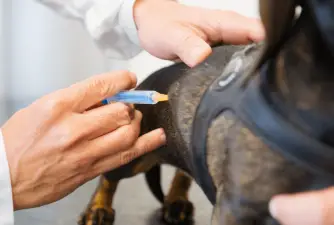What to do if Your Dog is Coughing & Gagging
21.04.2021.
Our dogs can demonstrate all sorts of horrible sounds, and coughing and gagging are among the worst ones. There isn’t a single dog owner that won’t worry about their dog’s health when they hear that horrible sound coming from their beloved pet. However, before you call your vet in a panic, there are things you should know and keep an eye on so that when you visit your vet, you can explain what’s been going on.
Difference between coughing and gagging
When you tell your vet what is wrong with your dog, you should know what things are important to mention. The difference between coughing and gagging is huge, and inexperienced dog owners might be confused about them. It is a good idea to take a video of the dog’s behavior while coughing and gagging, so you can show it to your vet.
When dogs cough, they don’t usually expel anything from their throats or lungs. Some saliva and mucus might be discharged, but that is generally swallowed immediately. This might seem a bit disgusting, but dog ownership will include things you might not be too enthusiastic about.
Dog gagging is a loose term that describes “vomit-like” behavior, but no stomach content is expelled. When dogs vomit, that should be clearly visible. Their stomach content will be expelled across your floor. Gagging is different. It will not produce any stomach content, but there might be a bit of mucus. The dog will open their mouths and make a retching sound, but nothing will come out.
What to observe?
Believe it or not, there is a massive difference if gagging happens before or after coughing. The correct order will let your vet know which diseases they should be looking into and diagnosing. This shouldn’t be too difficult to observe since gagging usually happens in conjunction with coughing.
Why do dogs cough and gag?
There are different reasons a dog may be coughing and gagging. The order in which that happens will tell your vet which area of your dog’s respiratory system they should be looking at. It is interesting how such minor distinctions can tell us a lot about possible health issues. If the coughing and gagging behavior continues, you should visit your vet as soon as possible. In the meantime, here is what both orders mean;
Coughing first
If your dog coughs first, then gags, that points us in the direction of the lower part of the respiratory system. Diseases that cause bronchitis will affect that part of the respiratory system. Your vet will be more comfortable diagnosing this type of disease if you are sure in the order coughing and gagging are happening.
Gagging first
If your dog gags first, and the gagging is followed by coughing, that points us to the upper part of the respiratory system. Gagging first usually means there is some sort of larynx disfunction.
Two of the most common reasons dogs gag are infections and laryngeal paralysis. The most common infectious disease that causes gagging is kennel cough.
Kennel cough
Kennel cough is a common reason dogs, especially puppies, can start gagging. If the dog is infected with kennel cough, they will make goose-like, harsh cough sounds usually followed by gagging. You can read more about kennel cough and its prevention here - What is kennel cough?
Laryngeal paralysis
While kennel cough is somewhat known among breeders and owners, laryngeal paralysis doesn’t have the same level of fame. This is a common condition among older Labradors. In laryngeal paralysis, the larynx doesn’t function properly, and it is no longer capable of closing. That will allow pieces of food and water to pass into the dog’s airways, which will cause coughing and gagging. This is a progressive condition, which means it starts slow and worsens over time.
Should I be concerned if my dog coughs and gags?
In most cases, a dog’s coughing and gagging are not a reason for concern. Just like humans, they can eat or drink, and the food or fluid “can go down the wrong pipe.” This will cause your dog to cough and gag but is usually not a reason for serious concern.
If the symptoms (coughing and gagging) last longer than 48 - 72 hours, it is time to get concerned. You should keep an eye out for other symptoms and make sure your dog is not showing signs of lethargy, loss of appetite, or breathing issues. If you notice these things, ask for a check-up as soon as possible. Respiratory issues should not be taken lightly, and luckily, vets usually take them very seriously.
How are coughing and gagging treated?
The treatment process will depend on what is causing your dog to cough and gag. The vet will examine your dog, and based on one or more tests, they will make a diagnosis. Luckily, even the worst cases of gagging can be treated. There are effective ways to reduce the dog’s discomfort and gagging to a minimum, and infections are easily treatable with antibiotics.
The most important thing is to listen to your vet and take their advice on your dog’s therapy. Make sure you stick to it till the end, and your dog should feel better in no time.
World Dog Finder team







Share